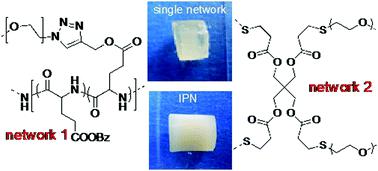当前位置:
X-MOL 学术
›
J. Mater. Chem. B
›
论文详情
Our official English website, www.x-mol.net, welcomes your
feedback! (Note: you will need to create a separate account there.)
Biocompatible polypeptide-based interpenetrating network (IPN) hydrogels with enhanced mechanical properties.
Journal of Materials Chemistry B ( IF 6.1 ) Pub Date : 2020-07-28 , DOI: 10.1039/d0tb01422b Shona O'Brien 1 , Ruairí P Brannigan , Rita Ibanez , Bing Wu , Joanne O'Dwyer , Fergal J O'Brien , Sally-Ann Cryan , Andreas Heise
Journal of Materials Chemistry B ( IF 6.1 ) Pub Date : 2020-07-28 , DOI: 10.1039/d0tb01422b Shona O'Brien 1 , Ruairí P Brannigan , Rita Ibanez , Bing Wu , Joanne O'Dwyer , Fergal J O'Brien , Sally-Ann Cryan , Andreas Heise
Affiliation

|
Hydrogels are widely used for biomedical applications such as drug delivery, tissue engineering, or wound healing owing to their mimetic properties in relation to biological tissues. The generation of peptide-based hydrogels is a topic of interest due to their potential to increase biocompatibility. However, their usages can be limited when compared to other synthetic hydrogels because of their inferior mechanical properties. Herein, we present the synthesis of novel synthetic polypeptide-based interpenetrating network (IPN) hydrogels with enhanced mechanical properties. The polypeptide single network is obtained from alkyne functional polypeptides crosslinked with di, tri and tetra azide functional PEG by copper-catalysed alkyne–azide cycloaddition (CuAAC). Interpenetrating networks were subsequently obtained by loading of the polypeptide single network with PEG-dithiol and orthogonally UV-crosslinking with varying molar ratios of pentaerythritol tetraacrylate. The characteristics, including the mechanical strength (i.e. compressive strength (UCS), fracture strain (εbreak), and Young's modulus (E)) and cell compatibility (i.e. metabolic activity and Live/Dead of human Mesenchymal Stem Cells), of each synthetic polypeptide-based IPN hydrogel were studied and evaluated in order to demonstrate their potential as mechanically robust hydrogels for use as artificial tissues. Moreover, 1H NMR diffusometry was carried out to examine the water mobility (DH2O) within the polypeptide-based hydrogels and IPNs. It was found that both the mechanical and morphological properties could be tailored concurrently with the hydrophilicity, rate of water diffusion and ‘swellability’. Finally it was shown that the polypeptide-based IPN hydrogels exhibited good biocompatibility, highlighting their potential as soft tissue scaffolds.
中文翻译:

具有增强的机械性能的基于生物相容性多肽的互穿网络(IPN)水凝胶。
水凝胶由于其相对于生物组织的模仿特性而被广泛用于生物医学应用,例如药物输送,组织工程或伤口愈合。基于肽的水凝胶的产生是令人感兴趣的话题,因为它们具有增加生物相容性的潜力。但是,由于其机械性能较差,与其他合成水凝胶相比时,它们的使用可能受到限制。在本文中,我们提出了具有增强的机械性能的新型基于合成多肽的互穿网络(IPN)水凝胶的合成。多肽单网络是通过铜催化的炔-叠氮化物环加成反应(CuAAC)从与二,三和四叠氮功能PEG交联的炔功能多肽获得的。随后通过用PEG-二硫醇装载多肽单网络并以不同摩尔比的季戊四醇四丙烯酸酯正交进行UV-交联来获得互穿网络。特性,包括机械强度(即抗压强度(UCS),断裂应变(ε断裂),和杨氏模量(ë))和细胞相容性(即,代谢活性和人类的活/死间质干细胞),每个合成基多肽IPN水凝胶,进行了研究和进行了评估以证明其潜在的机械稳健性水凝胶用作人造组织的潜力。此外,进行1 H NMR扩散分析以检查水的迁移率(D H 2 O)在基于多肽的水凝胶和IPN中。已经发现,可以同时调节机械性能和形态性能以及亲水性,水扩散速率和“溶胀性”。最后,表明基于多肽的IPN水凝胶表现出良好的生物相容性,突出了其作为软组织支架的潜力。
更新日期:2020-09-02
中文翻译:

具有增强的机械性能的基于生物相容性多肽的互穿网络(IPN)水凝胶。
水凝胶由于其相对于生物组织的模仿特性而被广泛用于生物医学应用,例如药物输送,组织工程或伤口愈合。基于肽的水凝胶的产生是令人感兴趣的话题,因为它们具有增加生物相容性的潜力。但是,由于其机械性能较差,与其他合成水凝胶相比时,它们的使用可能受到限制。在本文中,我们提出了具有增强的机械性能的新型基于合成多肽的互穿网络(IPN)水凝胶的合成。多肽单网络是通过铜催化的炔-叠氮化物环加成反应(CuAAC)从与二,三和四叠氮功能PEG交联的炔功能多肽获得的。随后通过用PEG-二硫醇装载多肽单网络并以不同摩尔比的季戊四醇四丙烯酸酯正交进行UV-交联来获得互穿网络。特性,包括机械强度(即抗压强度(UCS),断裂应变(ε断裂),和杨氏模量(ë))和细胞相容性(即,代谢活性和人类的活/死间质干细胞),每个合成基多肽IPN水凝胶,进行了研究和进行了评估以证明其潜在的机械稳健性水凝胶用作人造组织的潜力。此外,进行1 H NMR扩散分析以检查水的迁移率(D H 2 O)在基于多肽的水凝胶和IPN中。已经发现,可以同时调节机械性能和形态性能以及亲水性,水扩散速率和“溶胀性”。最后,表明基于多肽的IPN水凝胶表现出良好的生物相容性,突出了其作为软组织支架的潜力。











































 京公网安备 11010802027423号
京公网安备 11010802027423号